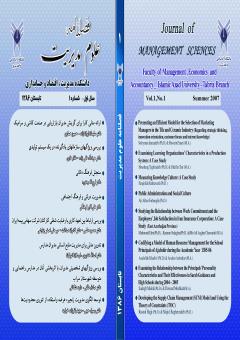بررسی ارتباط بین تعهد کاری با رضایت شغلی کارکنان شرکت سهامی بیمه ایران- مطالعه موردی استان آذربایجانشرقی
محورهای موضوعی : مدیریت بازرگانیمحمود علمی 1 * , کامران صداقت 2 , میرعلی اصغر چاوشی 3
1 - استادیار و عضو هیأت علمی گروه جامعه شناسی،واحد تبریز، دانشگاه آزاد اسلامی،تبریز،ایران
2 - استادیار دانشگاه تربیت معلم آذربایجان
3 - کارشناسی ارشد مدیریت دولتی
کلید واژه: تعهد شغلی, تعهدکاری و رضامندی شغلی,
چکیده مقاله :
از جمله معضلات اساسی جامعه ما در جهت دستیابی به توسعه فرهنگی، اقتصادی و اجتماعی ضعف وجدان کاری یا تعهد کاری در میان بخش قابل توجهی از شاغلین کشور است و این موضوع به عنوان یک مسئله اجتماعی مطرح شده است زیرا ضعف تعهدکاری به عنوان واقعیتی بالفعل (شیوهای از رفتار) در جامعه وجود دارد که از دید عاملان اجتماعی به ویژه حاملان ارزشهای رسمی جامعه به عنوان مسئله اجتماعی مطرح شده است که قابل حل میباشد. از سوی دیگر کاوش دربارة پایگاه وجودی نیروی تعهد کاری در سلسله مراتب ادراکی شاغلین و پیبردن به ساز و کار تأثیرگذاری آن مقدمهای ضروری برای هر گونه برنامهریزی و اجرای سیاستهای مناسب در جهت ارتقای تعهد کاری است. به نظر میرسد ایجاد تقویت و تسریع تعهد کاری در عرصه های مختلف جامعه پیآمدهای مثبت فراوانی داشته باشد. بر همین اساس هدف از این مطالعه بررسی ارتباط تعهدکاری با رضایت شغلی کارکنان شرکت سهامی بیمه ایران استان آذربایجانشرقی میباشد. تحقیق حاضر با مطالعه روی 55 نفر از کارکنان شرکت سهامی بیمه ایران مرکز استان آذربایجانشرقی انجام گرفته است، روش تحقیق پیمایشی از نوع همبستگی بوده و از نظر زمانی یک مطالعه مقطعی میباشد. گردآوری دادهها به صورت میدانی و تکمیل پرسشنامه انجام گرفته است و از طیف لیکرت برای اندازهگیری رضایت شغلی و تعهدکاری استفاده شده است. دادهها پس از گردآوری با استفاده از نرم افزار آماری SPSS و آزمونهای Corellation و Anova t-test مورد تجزیه و تحلیل قرار گرفته است. بررسیها نشان داد که متوسط سن کارکنان 63/718/33 بوده و 8/77 درصد از کارکنان شرکت بیمه مذکر و 2/22 درصد مونث بودند، 7/71 درصد کارکنان متأهل و 3/28 درصد مجرد بودند. کارمندان با عناوین رئیس اداره، معاون مسئول دایره و کارشناسان مشخص گردیدند که بیشترین درصد مربوط به کارشناسان بود (6/42). از نظر میزان تحصیلات، کارمندان دارای مدرک دیپلم و لیسانس، بیشترین درصد را به خود اختصاص داده بودند (2/35)، از نظر وضعیت استخدامی کارمندان رسمی بیشترین درصد را دارا بودند (9/50%).بر اساس نتایج به دست آمده متوسط میزان تعهدکاری کارکنان شرکت بیمه 3/10 51/50 و متوسط میزان رضایت شغلی کارکنان 44/7 28/59 بود نتیجه اینکه بین تعهدکاری و رضایت کارکنان همبستگی مستقیم وجود دارد ( 000/0=p) به این معنی که با افزایش رضایت شغلی کارمندان تعهد کاری آنها نیز افزایش پیدا میکند.
One of the major problems of our society in accessing cultural, ecomical, and social development is the lowness of work conscience, or work commitment, among a considerable part of the country's employees. This has been addressed as a social problem since lack of work commitment exists as an actual reality (way of behavior) that has been put forward by the officials especially those who maintain the social values, as a social problem that can be solved. On the other hand, enquiry into the place of the power of work commitment within the conceptual hierarchy of the employees and understanding the mechanisms of its effectiveness are the necessary first step in any planning and executing suitable policies to promote work commitment. It seems that creating, reinforcing, and accelerating work commitment will have numerous positive results in the different areas of society. Therefore, this research aims to study the relationship between work commitment and the job satisfaction of the employees of Iran Insurance Company in EastAzarbaijanProvince. The research method is correlational survey, and it is cross-sectional from the view point of time. The research population consists of 55 employees of Iran Insurance Company in EastAzarbaijanProvince. Data collection was carried out using field research and filling out questionnaires, and Likert Scale was used to measure the job satisfaction and work commitment.
sChalabi, M. (1996). Sociology of Order. Tehran: Ney Publication, (In Persian).
Gruneberg, M. M. (1979). Understanding job satisfaction. London: Mac Millan.
Hexis Hubert, J. (1997). Theories of Organization and Management. Translated by: G., Kohan, Tehran: Agah Publishing, (In Persian).
Locke, E. A. (1980). The nature and causes of job satisfaction in the public sector. Journal of social Issues.
Mashbaki, A. (1997). Commitment of Conscience and Administrative Transformation. Hamshahri Newspaper, 1446, (In Persian).
Mirsepasy, N. (1995). Labor Law, Work Consciousness and Work Culture. Tadbir Journal, 11-17, (In Persian).
Nayeli, A. (1994). Motivation in Organizations. Ahwaz: Shahid Chamran University Publishing, (In Persian).
Rajabzadeh, A. (1997). Values and Weakness of Conscience in Iran. Research Letter, 5, 61-73, (In Persian).
Sedaghat, K. (2000). Surveying the Conscientiousness of Hospital Workers in Tabriz Hospitals affiliated to Tabriz University of Medical Sciences, (In Persian).
Soltani, I. (1996). Employee Conscience Measurement Test. Tadbir Journal, 79, (In Persian).
_||_
Chalabi, M. (1996). Sociology of Order. Tehran: Ney Publication, (In Persian).
Gruneberg, M. M. (1979). Understanding job satisfaction. London: Mac Millan.
Hexis Hubert, J. (1997). Theories of Organization and Management. Translated by: G., Kohan, Tehran: Agah Publishing, (In Persian).
Locke, E. A. (1980). The nature and causes of job satisfaction in the public sector. Journal of social Issues.
Mashbaki, A. (1997). Commitment of Conscience and Administrative Transformation. Hamshahri Newspaper, 1446, (In Persian).
Mirsepasy, N. (1995). Labor Law, Work Consciousness and Work Culture. Tadbir Journal, 11-17, (In Persian).
Nayeli, A. (1994). Motivation in Organizations. Ahwaz: Shahid Chamran University Publishing, (In Persian).
Rajabzadeh, A. (1997). Values and Weakness of Conscience in Iran. Research Letter, 5, 61-73, (In Persian).
Sedaghat, K. (2000). Surveying the Conscientiousness of Hospital Workers in Tabriz Hospitals affiliated to Tabriz University of Medical Sciences, (In Persian).
Soltani, I. (1996). Employee Conscience Measurement Test. Tadbir Journal, 79, (In Persian).

